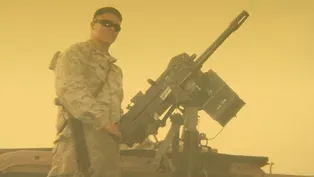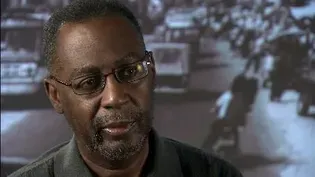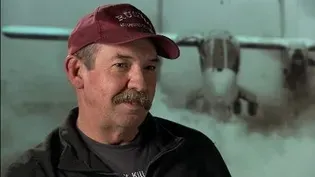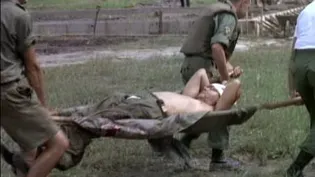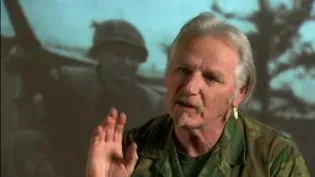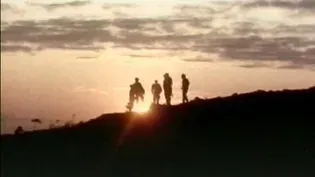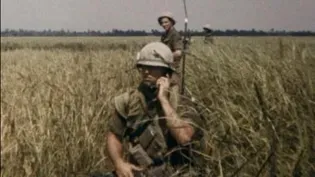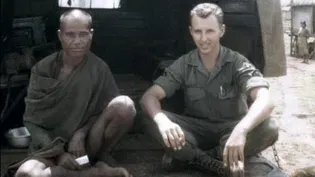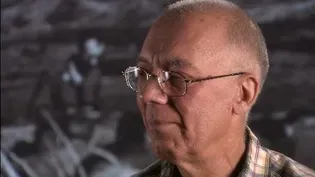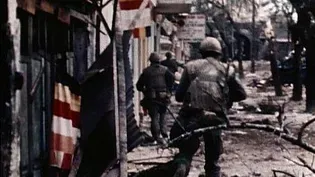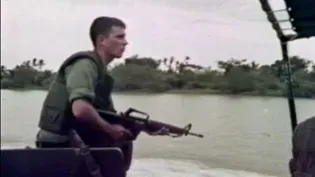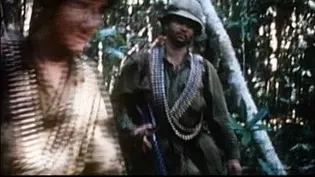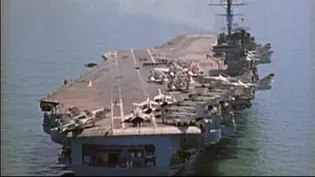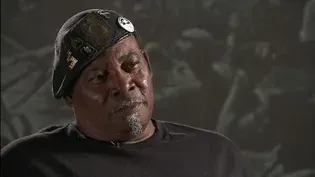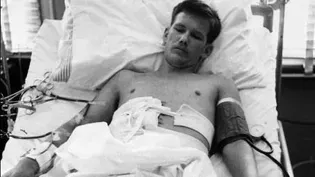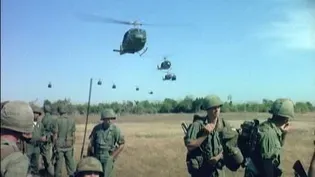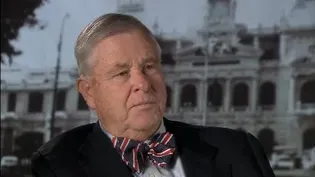
Vietnam: Draw Down - Broken Bodies
Clip | 7m 17sVideo has Closed Captions
Wounded veterans and hospital staff describe field hospital scenes and returning home.
Forever Wounded veterans and Army hospital staff describe chaotic field hospital scenes in Vietnam, where the numbers of injured and dead continued to rise as the war carried on. Two Wisconsin veterans who lost limbs in battle share their challenges of adjusting to life back at home. (Part 1/7)
Problems with Closed Captions? Closed Captioning Feedback
Problems with Closed Captions? Closed Captioning Feedback
Wisconsin War Stories is a local public television program presented by PBS Wisconsin
Thanks to lead gifts from Don and Roxanne Weber, Associated Bank, Ho Chunk Nation and the Lynde and Harry Bradley Foundation.

Vietnam: Draw Down - Broken Bodies
Clip | 7m 17sVideo has Closed Captions
Forever Wounded veterans and Army hospital staff describe chaotic field hospital scenes in Vietnam, where the numbers of injured and dead continued to rise as the war carried on. Two Wisconsin veterans who lost limbs in battle share their challenges of adjusting to life back at home. (Part 1/7)
Problems with Closed Captions? Closed Captioning Feedback
How to Watch Wisconsin War Stories
Wisconsin War Stories is available to stream on pbs.org and the free PBS App, available on iPhone, Apple TV, Android TV, Android smartphones, Amazon Fire TV, Amazon Fire Tablet, Roku, Samsung Smart TV, and Vizio.
[ethereal music] - David Kies: 7:20 in the morning along the river, we were policing up our equipment, and boom, claymore went off.
I still don't know what happened exactly, how it went off.
But the guy who I was with, Eric, was killed, and we both lost both our legs.
But he died, and I didn't.
And the third guy that was with us, never knew his name, had both of his eardrums broken.
There was always a medic very close.
He shoved a cigarette in my mouth, and he gave me a shot of morphine.
I said, "Give me another one."
He said, "I can't; it's against regulation."
But he did.
[chuckles] That's probably why I didn't pass out.
Took me to the helicopter.
And one of the guys I met at my first reunion said, "I've been holding this back for 33 years."
But he said, "I threw your legs on the helicopter."
[laughs] - John Dederich: You wake up, you got tubes coming outta you, every which direction.
You look around, and you say, "Well, I really don't wanna live anyway."
Then I flew back to the field hospital in Da Nang, thrown into just a huge area where wounded people are coming in and out, and they're doing surgery on 'em, and putting 'em on a stretcher, hosing off the cement area that they're doing it, bringing on another one.
And you're laying there, just kind of watching and trying to get the hell out of there.
I remember turning to one side so I wouldn't have to watch the constant traffic.
You think the only war that's going on is the one that you're fighting.
When I was in that field hospital, I realized that there's thousands of 'em just like us.
And they're getting wounded every day.
- Alice Plautz: Sometimes we'd work 18, 20, 24 hours straight just getting everybody off the table.
We had neurosurgeons.
We had chest surgeons, orthopedics, all the different specialties.
So that like, if they were wounded and they went to a surgical hospital, which was just immediate, you know, get 'em breathing and keeping 'em alive, then they would come to us.
But a lot of times, we would get the fresh wounded.
There were many nights that we would get 300 to 350 in about an eight-hour period.
And sometimes, they'd be on our operating table a half hour after they were wounded.
There would be blood all over the place, the floor.
You know, they would wash it in between.
But you could be standing in blood through the whole case.
And when you've watched them cut the arms, the legs, and then take out the eyes of a 19-year-old, you want to go, "Ah, get me out of here."
- Came back to Walter Reed.
That was a great place, unlike what you hear today.
A ward with about 40 beds on it.
And it was an amputee ward.
And some guys by that time were hooked on morphine.
So there was a lot of screaming.
It was like, if you didn't know, you'd swear you were in a crazy house someplace.
It was like a mental ward.
But I had a doctor one night that came to me.
And he said, "I know what they're going to do to you."
They're gonna give me a knee disarticulation.
In other words, take my knee apart.
He said, "Don't let 'em do it."
He said, "I know where you're going.
You're going to Madison when you get outta here."
He said, "There's some really good doctors in Madison."
- Then I went from Da Nang to the Philippines.
That's where I met probably the smartest or cruelest doctor in my life.
He yanked the bandages off of my raw wounds onto both of the legs.
And he said, "Son, you're just a mess.
"You're gonna cost us a lot of money to put back together.
You better go get a good job and pay a lot of taxes."
[laughs] You know?
And at the time, I thought it was a pretty good statement.
I thought it was funny.
- One of the things I still haven't figured out how they did it is they always had their records with them.
And I would open the records.
And I'd say, "This is Johnny Brown from Cincinnati, Ohio.
And he's got two sisters and three brothers."
And I realized this was making it more difficult.
And one night, one of the surgeons says, "Alice, "you haven't read us a chart in a long time or one of the records."
And I said, "No, and I'm never going to do it again."
Then he started to laugh.
He says, "Yeah, I know what you're thinking."
You know, because it was.
They became your younger brothers.
- I did come back to Madison Hospital.
Wheeled me into the back.
He just left me there in a gurney, just a sheet over me.
This guy walked up to me in a three-piece suit and whipped the covers back and started poking me.
He had a cigarette in his mouth with an ash about two inches long.
I thought, "It's gonna fall on me."
That was my doctor.
[laughs] - Then I flew into Oakland Naval Hospital.
Amputees as a group, there was one, two, three wards of 'em, which would have been about 60 amputees just from Vietnam at the time.
You know, we're in a wheelchair for six, seven months.
I mean, one of the funniest things you ever see in your life are two amputees in wheelchairs, you know, trying to do it.
One guy says, "I'll kick your ass."
The other guy says, "With what?"
[chuckles] You know, it just can't happen.
But yeah, we would practice balancing on the back wheels of the wheelchair, going down the hills of San Francisco.
- I had a Corvair at the time.
I used to drive with my hands, totally illegal.
[laughs] 'Cause it was so small, I could just reach down to the brake.
And for the gas, I'd use my cane.
I can remember going to my dentist, and he was on the second story of an old hospital building.
I'd throw my wheelchair up as far as I could get it and climb up on my knees, get it, throw it up some more.
So I went up two flights of stairs like that.
[chuckles] But there were barriers everywhere.
There was no disabled plates on your car.
There were no hang tags from your mirror.
There was never a ramp anywhere.
But it was because of the Vietnam thing that it all came about.
- We had a room where people could come in and sit down.
We had television.
And we used to watch-- at the end of the week, they would give you the statistics of what happened that week.
Fifty people wounded, three people killed.
And we'd say, "Isn't that fascinating "that in this whole country, "they're saying only 50 people were injured?
"Do you think they counted those 300 that they brought to us a couple days ago?"
Even then, they weren't telling the truth about how many people were wounded.
- I think learning to walk with the artificial legs is probably the biggest challenge.
But we had people that just would throw their meals.
They wouldn't take any treatment.
They would refuse to wear an artificial limb or leg and all those kinds of things.
And I felt the same way when I didn't want to live or when I didn't want anybody to see me the way I was.
You know, am I fortunate that I was 19?
Yeah, kind of, because I didn't have any choice.
The other choice was not to.
You know, so I had my whole life ahead of me.
I mean, I spent 10 months in a country that determined how I was gonna live the rest of my life.
So yeah, I was going to either feel sorry for myself or get on and make some doctor in the Philippines really happy.
Video has Closed Captions
OIF Army veteran Crystal hits the road to find her way home to an organic farm. (5m 20s)
Video has Closed Captions
Vietnam War veterans help today's veterans cope with the invisible scars of combat. (30s)
Vietnam: Draw Down - Rear Echelon
Video has Closed Captions
Veterans assigned to support jobs in the military describe life on and off duty. (7m 40s)
Vietnam: Draw Down - Hamburger Hill
Video has Closed Captions
Veterans recall the haunting memories of a battle they waged for many days. (6m 49s)
Vietnam: Draw Down - Firepower
Video has Closed Captions
Air Force veterans recount dangerous missions targeting the North Vietnamese Army. (8m 1s)
Vietnam: Draw Down - Broken Bodies
Video has Closed Captions
Wounded veterans and hospital staff describe field hospital scenes and returning home. (7m 17s)
Vietnam: Turning Point - Walking Point
Video has Closed Captions
Veterans describe the dangers and responsibilities of walking point. (6m 56s)
Vietnam: Turning Point - The Price
Video has Closed Captions
Veterans reflect on the staggering casualties in Vietnam, and how they coped. (8m 19s)
Vietnam: Turning Point - TET 1968
Video has Closed Captions
The Tet Offensive shocked both soldiers and the American public. (8m 13s)
Vietnam: Turning Point - Montagnards
Video has Closed Captions
Veterans discuss working with the Montagnards, people indigenous to Vietnam. (6m 57s)
Vietnam: Turning Point - Khe Sanh
One of the bloodiest battles of the Vietnam War took place at Khe Sanh. (7m 36s)
Vietnam: Turning Point - Hue City
Video has Closed Captions
The battle at Hue City highlighted the dire state of the Vietnam War. (6m 47s)
Vietnam: Turning Point - Brown Water Navy
Video has Closed Captions
River-based Army and Navy veterans describe facing enemy attacks and Agent Orange. (8m 12s)
Vietnam: Escalation - Send in the Marines
Video has Closed Captions
Marines describe their arrival in Vietnam and the difficulty of jungle warfare. (8m 7s)
Vietnam: Escalation - Naval Presence
Video has Closed Captions
Navy veterans explain their experiences off shore supporting Special Forces. (7m 16s)
Vietnam: Escalation - Elusive Enemy
Video has Closed Captions
Encounters with underground tunnels and their growing uncertainty in the mission. (8m 2s)
Vietnam: Escalation - Dropping Bombs
The allure, challenges and heartbreaking loss of early air combat in Vietnam. (6m 44s)
Vietnam: Escalation - All Hell Broke Loose
As missions became more dangerous, casualties rose. (8m 48s)
Vietnam: Escalation - Airmobile
Veterans of the helicopter brigades describe experiences of bravery, danger and loss. (7m 54s)
Vietnam: Escalation - Advise and Assist
Explore the early events that set the conflict and United States participation in Vietnam. (6m 6s)
Providing Support for PBS.org
Learn Moreabout PBS online sponsorshipSupport for PBS provided by:
Wisconsin War Stories is a local public television program presented by PBS Wisconsin
Thanks to lead gifts from Don and Roxanne Weber, Associated Bank, Ho Chunk Nation and the Lynde and Harry Bradley Foundation.

